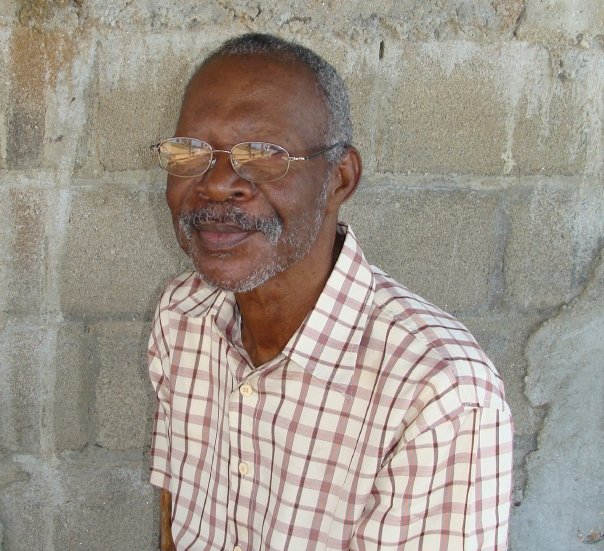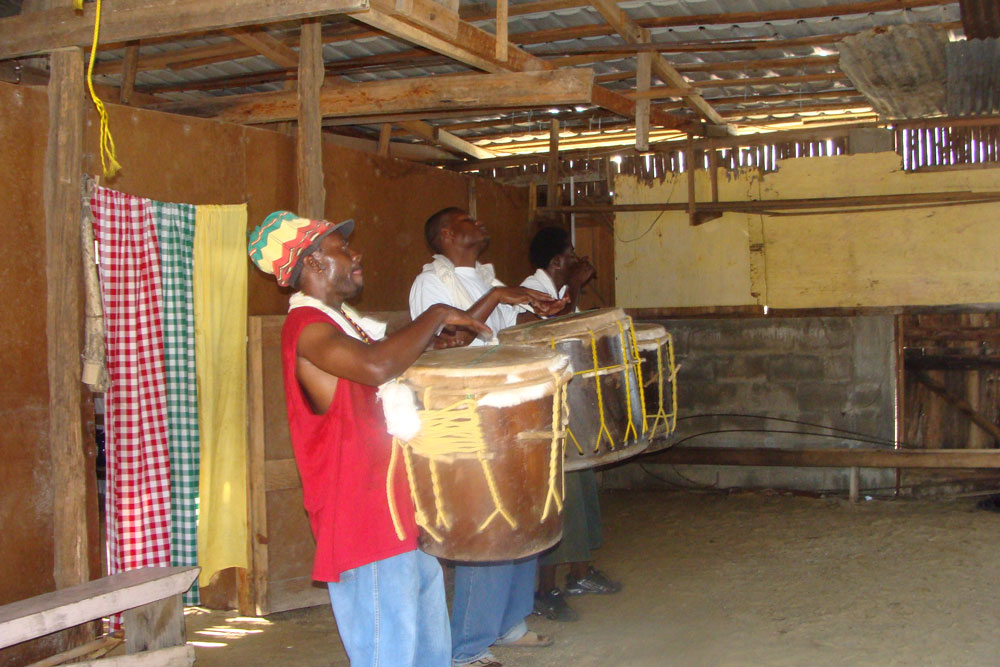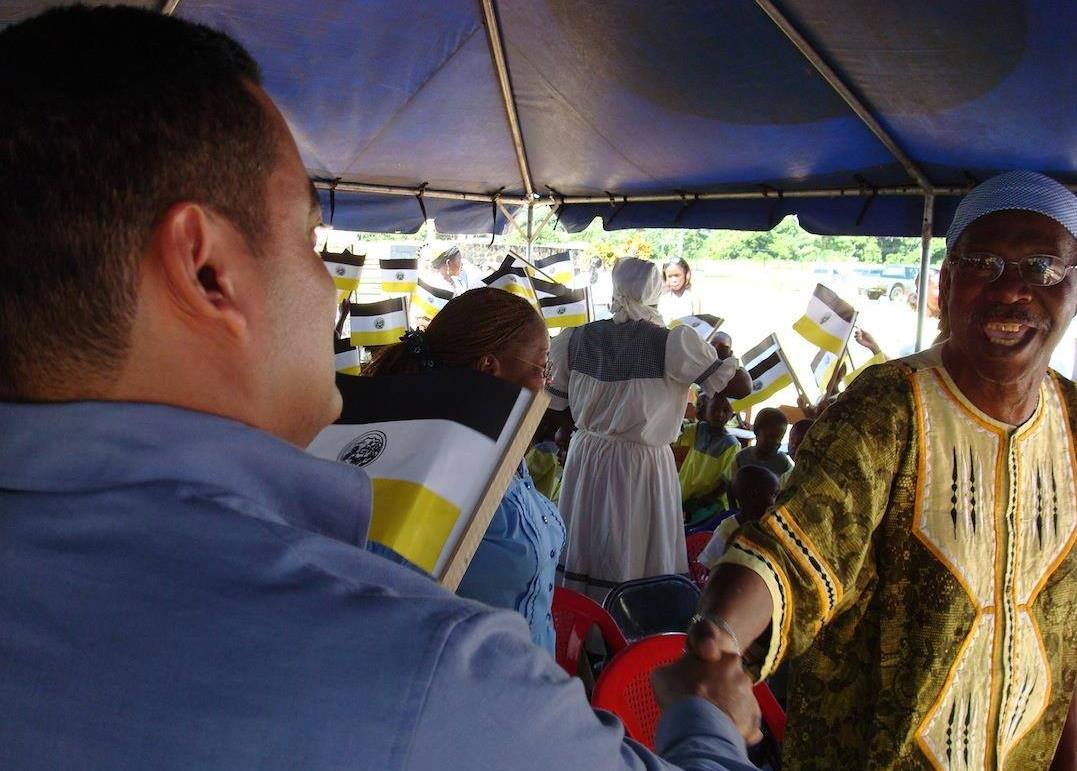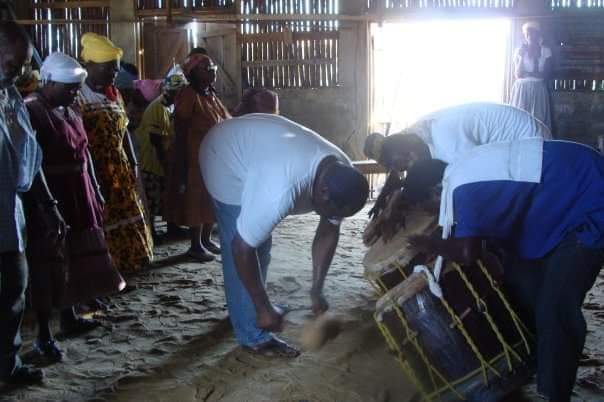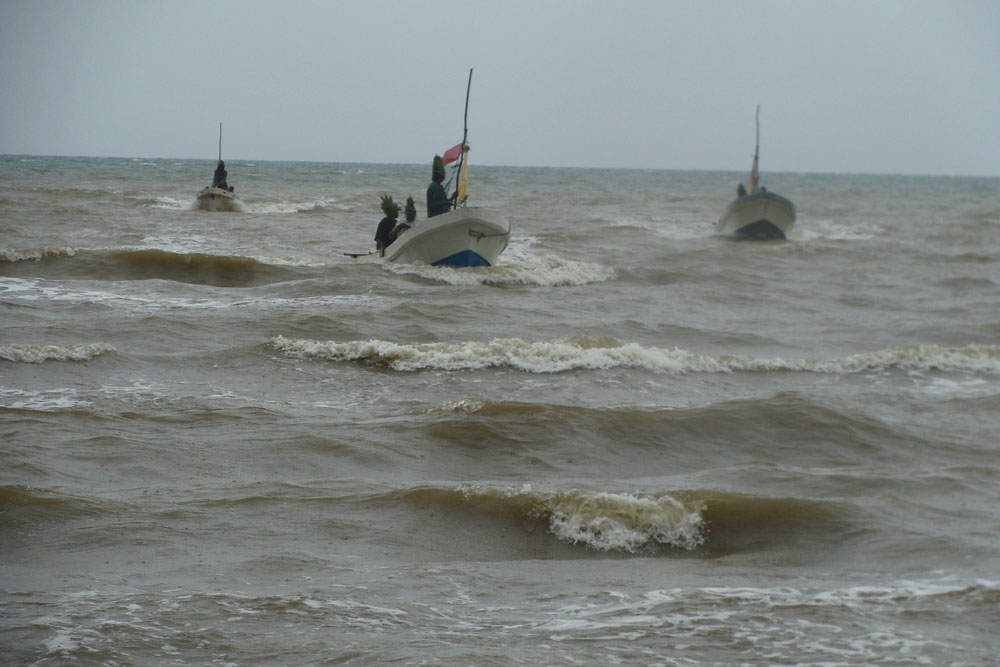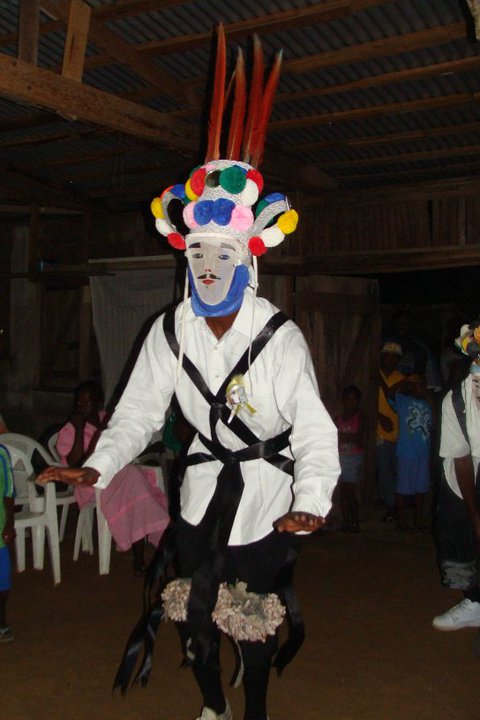In Memory of — Tun Láhari
Buyei John Mariano
Sacred Heart Church—September 26, 2009
By Myrtle Palacio
With eyes twinkling and that mischievous smile, Baba John Mariano once gave words of wisdom that translates something like this: sorrow comes in great waves … but it just rolls over us, and though it may almost smother us, it leaves us standing; and we know that if it is strong, we are much stronger, inasmuch as it passes, we remained steadfast.
John Mariano was born on June 24, 1936 to the late William “Masugaran” Mariano and Leocardia “Lady Lard” Ruiz Bernardez. He was 73 years old and was the third child of four children from this union. Baba, as he is lovingly known due primarily to the leadership/fatherly role of protecting crucial aspects of the Garifuna culture; came into a family gifted with spiritual leadership and healing—his aunt Melvinia “Chupon” Thompson, his grand uncle Evanjelisto “Banje” Lambey, his great grandfather John “Juan Buyei” Lambey, his great grand uncle Deing Balthazar, his mother a composer in her own right…much later his sister Sarah….So it may not have been surprising to the Elders that John demonstrated this gift, except that it occurred at an unusual tender age of four years—this was the first insight into Baba’s future life. At the early age of 22, he took for his wife the beautiful and gracious Gretel Digna Guerrero in December 1958; and most of you I am quite sure have heard the many versions of that courtship from Baba himself, a story which still leaves Greta blushing. For the next 50 years, Greta Digna became his: sidekick, secretary, pen-a-pon, lagani, lumada, lumari…his partner until death. In seeking a better life, aban hei-ding Lisurnia—when they both migrated to the United States in 1963. He returned home to Dangriga around 1993, after over 30 years abroad.
Baba John did not like to be the center of much attention. If he was physically sitting among us now, he would want us to take the attention off him. He would not want us to focus on the sadness of his death, but instead on ways and means of carrying on and building on what he and other leaders started. I have much consolation in the good feelings and memories of Baba shared with me these past few days by family members and friends…just those who knew him.
There are those who saw Baba John as a compassionate, caring, kind and giving person; others saw him as a role model, a great friend, a father figure, a fair leader, one ready to offer advice, and willing to share his knowledge. Personally he was an older brother being great grandchildren of siblings, Balbina Velasquez Cacho and Gregoria Velasquez Lambey, but also as a sort of Guardian Angel who has taught me much. No doubt Baba has impacted his community greatly particularly in forwarding the development of Garifunaduáü. As Cannon Val pointed out, there are several Baba personalities, inihen Baba le Buyei, Baba le Wanaragua. There is also Baba the educator and Baba the community advocate and communicator; not forgetting Baba the husband and father who along with Digna nurtured not only his children, but also his grandchildren.
Baba le Buyei believed that his gift of healing and spirituality is exactly that, a gift bestowed upon him by the Ahari, lidagiyen Juan Buyei le lebu. It became a responsibility which he accepted with much honour and humility; and was the primary reason for Baba’s and Greta’s return to Belize. In 1993 he worked with his sister Buyei Sarah and eventually took responsibility for the Dabuyaba. In using his gift of healing, Baba like Nitu Sarah, opened his doors to all, todos, and from all walks of life—not only Garinagu…and at all hours of the day and night. There are many stories of Baba’s healing powers whether in Honduras, the US or those who visited him in Dangriga, from all over the Belize Country. I have witnessed his healing including participating at all levels of the Dügǘ ceremony. Yet, Baba always remained humble, never flaunting his knowledge and powers; in fact, he preferred not to be overly public with his healing abilities. While he is frank to those who have come requesting to understudy him that Buyeiship is not taught, he is always willing to give information and respond to people’s many queries. He would often say “I did not choose it, It choose me”. Yesterday I found several pages of transcripts of one of my several sit-downs with Baba, and this was about the various processes of the Dügǘ ceremony. I am now forced to analyse and share this earlier than planned.
For the last Dügǘ in July, he was adamant that family members get together to practice the songs and equally anxious that more persons learn to call the Malí—the latter did not materialize as he was not in the best of health. I have had the opportunity to observe the spiritual leadership of Baba John, his sister Buyei Sarah before him, and other greats before them; and have come to realize the tremendous sacrifice they made in serving as Buyei. Oftentimes they neglect family and themselves to put people first—It is almost inhuman.
Baba le Wanaragua was the Abuti as the Keeper of the Wanaragua flame—passed down from Max Garcia, then John Wild, then Baba John as the Banquater. Baba John was passionate about maintaining discipline and dress code—long sleeves and stockings to hide the skin, the mask to remain on the face when outside, no drinking, offensive language, and “vulgar” dancing—always lau regula. He was against female participation, claiming that the Johncunu is a male dance and the participation of women was as choir members to sing for the drummers—and you can dare to challenge this at your own peril (ma ma dan le abigi ha lan lagu Baba)—“ah, weh a you deh Banquater”. Baba not only organized and led the annual activities, but while living abroad he often subsidized Cultural Clubs by donating ribbons, pins and other accessories used in the Wanaragua dress.
As an educator of the Garifuna culture, Baba John volunteered at several schools to lecture on various aspects of the Garifuna culture, particularity the spirituality. Since his retirement to Dangriga, he was charged with the annual Yurumei for the children of Christ the King Anglican School. He taught the children the songs, dances, drumming and Garifuna history. The children always looked forward to the practices and the actual re-enactment each November 19th. Baba also organized drumming and Wanaragua dancing for youths by the Dabuyaba in preparation for Christmas. Recently, the drummers at the Dügǘ ceremony are mainly young men who have been taught and /or influenced by Baba John.
Baba the Community Advocate promoted the Garifuna community even while living abroad through organizing dance groups, fund raising for organizations such as the United Garifuna Association in the US and the NGC in Belize. During my direct involvement with the NCG under the leadership of Yau Papa Lambey, Baba was a formidable supporter of all our activities. At the first NGC Convention in Belize City around 1990/91, Baba John flew in from New York to officiate a Malí as a part of the Opening Ceremony. Baba’s presence, the Malí, the Convention in Belize City, had tremendous political and social implications for the Garinagu then and even now.
In New York he linked the Belize and Honduran Garinagu, and continued to do so while in Dangriga through annual excursions sponsored by both Baba and Digna from Belize to Garifuna communities in Honduras—fourteen grueling but enjoyable traveling hours each way, shows the level of commitment to people and culture. He sponsored several persons –relatives as well as relative strangers to come to the US, some of whom have attributed their successes to this assistance from Baba John.
Baba is quietly assertive, but not afraid to voice his opinion. Although he has been painted with various political colours, Baba more supports issues and concerns of his people and community—He openly and strongly echoed that the PUP under the Rt Hon. Said Musa did more for Garifunaduáü and became a resilient supporter. He was also a member of many other organizations that are not necessarily ethnic: One that needs mention is his long-time membership in the Lodges—Steadfast Lodge of Belize City where he rose to Master Mason status in 1971, the Pythogoras Lodge of Dangriga, and the Witherson Lodge number 11 of New York, all branches of the Masonic Lodge.
Lastly, Baba contributed his portion of the Velasquez legacy of land in the Back-a-Town area to Government of Belize to be used as a basketball court for the youth. The basketball court was erected and is still presently in use—but with no fanfare for Baba John. He was the quiet voice of the voiceless—Ligia Umalali Lidan Limaniga.
Buyei John never wavered from his devotion to Garifuna culture. It was his unconditional devotion to keeping the Garifuna culture alive and his commitment to the role bestowed upon him as Buyei that are the hallmark of his life. The Government of Belize in recognizing his contribution to culture awarded Buyei John Mariano Special Recognition on the 25th anniversary of Belize’s independence in September 2006 and his grand-daughter Naiomi, read his introduction.
Sing: Idaba lagumucha weriduni, wayahuni Baba John, Idabo lagumucha wayahuni aye, Idaba lagumcuho, Idaba lagumcuho nayahuni Baba….
Baba passed away on September 12, in the presence of family members at the Kingsbrook Jewish Hospital in Brooklyn, New York. Our great leader has moved on to Seiri and he will be greatly missed. He has taught us well to carry on the work he has started—that Mali singing workshop will be held Baba. Buyei John is mourned by his family members:
Greta Digna his wife of over 50 years; his seven children Yolanda, Noel, Glen, Frank, Desiree, Malcolm and John Jr.; his siblings Thomas and Verona Mariano residing in the US and Amandeo Robert “Kapi” Mariano of Belize City; 22 grandchildren and 2 great grand children, several nieces and nephews.
Doung baru bumaragan woun Wabuyeri!!
Beiba Ameragua Baba
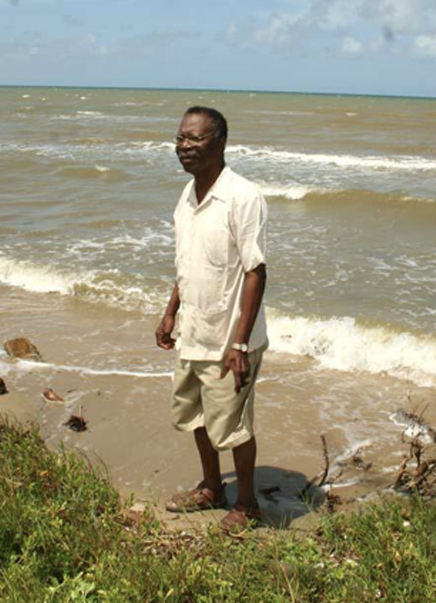
Sing: Mama hirute lidine weyu, Mama hírute lidine weyu, Mama hírute lidine weyu Dabuyabarugu. Mama michahounite woune, Mama meledehouniti woune, Mama michahounite woune, Mama meledehounite woune Dabuyabarugu….
